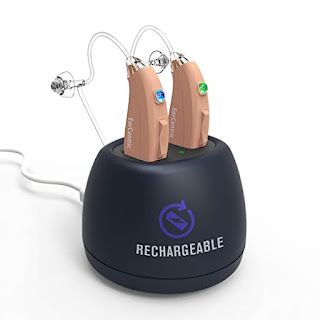Hearing Aids for Seniors-Amazing Benefits for Olders.
Don't be deceived by their dwarf appearance: These modern hearing aids have a significant positive impact on your health and well-being. We will discuss hearing aids for seniors and their amazing benefits here.
According to statistics from the World Health Organization from 2012:
1) roughly one-third of people over 65 suffer from an incapacitating hearing loss. Recent studies (see, for example, Fortunato et al.
2) have shown how hearing loss can impair cognitive function by lowering and deteriorating communication abilities, resulting in fewer social interactions and depression. Yet, the same research also showed that a decline in cognitive function may compound the negative consequences of hearing loss on quality of life.
Hearing loss and cognitive function are somewhat related to and affect one another. In this instance, hearing aids (HA) assist in In order to improve auditory inputs for hearing-impaired people, it's critical to learn more about how HAs may slow cognitive decline and, conversely, how cognitive abilities may affect the advantages that a hearing-impaired person might experience from using a HA.
Untreated hearing loss is well recognised to increase the risk of depression, dementia, and falling, among other health risks. According to experts, a large part of this is due to the social isolation brought on by hearing loss.
Must Read: Why do people Over age 50 avoid exercise?
What Advantages do Hearing Aids Offer?
There's a chance you'll hear sounds you haven't heard before.
The clarity of speech over the phone may improve.
Your family and friends may be able to reach you more readily.
In noisy environments, such as a restaurant or a large group of people, communication may be improved.
Best Hearing Aid:>Check Price to Buy
Hearing Aids for Seniors-Amazing Benefits for Olders
Individuals who have trouble hearing are just less aware of their surroundings, which increases their risk of being hit by a thoughtless bystander or falling over a hyperactive household pet.
Balance also needs mental effort. The issue is that those who have hearing loss need more of that grey matter to hear, which leaves them with fewer mental resources to support their balance.
#Boost your mood
Depression has a link to hearing impairments. The National Council on Aging showed that those with untreated hearing loss are more likely to experience sadness and anxiety than senior people who wear hearing aids in a survey of 2,300 hearing-impaired seniors 50 years of age and older.
Among those with significant hearing loss, 30% of hearing aid nonusers admitted to feeling depressed, compared to 22% of hearing aid users.
One potential explanation is that those who have hearing loss are significantly less likely to engage in social activities.
Jackie Clark, a clinical audiologist and clinical professor of audiology at the University of Texas at Dallas, believes that "we're community creatures." "Isolation breeds loneliness, and loneliness breeds despair."
#Boost your mental capacity
Hearing aid use can enhance working memory and brain function. 35 older persons with mild to moderate hearing loss who had never used hearing aids were monitored by a research team from the University of Maryland's Department of Hearing and Speech Sciences (HESP). Over the course of six months, one group was provided with hearing aids, while the other was not.
The participants' working memory, attention, and processing speed were also evaluated, as well as their hearing, using a number of tests. The tests were repeated six months later. What they discovered: Those who wore hearing aids had enhanced memory as well as enhanced auditory processing.
If you are suffering from hearing loss, the signals coming in through your ears and getting sent to your brain are affected, so the brain has to do a lot of work hard to make sense of them according to Maria Wynens, an Atlanta-based audiologist.
He further says that the brain has a limited amount of energy, so at some point, it's going to have to pull energy from other places, such as thinking, memory and concentration.
Conversely, when you're able to hear, it frees up resources in the brain that can be used for cognitive function, says Professor Samira Anderson a HESP Assistant, who led the research at the University of Maryland.
#Lowering the Risk of Dementia
Johns Hopkins University and the National Institute on Aging researchers discovered that older persons with hearing loss may be more prone to dementia than those who have normal hearing. In a 2011 study, 639 individuals' hearing and cognitive abilities were periodically assessed over the course of 12 to 18 years.
None of the subjects got dementia, despite the fact that around 25% of them had some hearing loss at the start of the trial. Hearing loss at the start of the trial was found to significantly increase the risk of dementia later on.
Researchers suggest three possible connections between dementia and untreated hearing loss. The constant pressure of striving to make sense of noises over the Those with hearing loss are more susceptible to dementia because years have an overwhelming effect on their brains.
Also, persons who have trouble hearing become socially isolated, which reduces mental stimulation and eventually results in cognitive decline. The hearing region of the brain, which is also involved in mental activities like memory, learning, and thought, suffers the most damage from hearing loss.
#Increase your Profit
Hearing loss that is left untreated can hurt you financially. Depending on the severity of their impairment, people with hearing loss who don't wear hearing aids might lose up to $12,000 in income annually, as per a national survey conducted by the Better Hearing Institute over more than 40,000 households. Also, persons with significant hearing loss have unemployment rates that are about twice as high as those who choose to wear hearing aids and double those of people with normal hearing.
#Build up Relationships
Any self-help book worth its salt will tell you that communication is crucial for keeping friendships and for building a solid marriage. This seems to be supported by a British study: 44 % of those polled claimed that their relationships with their spouse, friends, or family suffered as a result of their inability to hear clearly; 52 per cent claimed that they felt excluded and ignored in social settings; 34 per cent had lost touch with friends and, in some cases, had witnessed marriages fail; and
Hearing loss can limit social encounters, disrupting the flow of conversation and making any kind of spontaneity pretty much impossible. And then there's the toll it takes on marriage. A study published by the ASHA
Leader found that relationships with partners seem to suffer the most from hearing loss. “The load shifts to the people around you, usually your spouse. And since it takes a lot of energy to do the work of repeating things, he or she will eventually stop doing it,” says Wynens.
The good news is that 70 per cent of respondents to a Hear the World Foundation poll of more than 4,000 people claimed that hearing aids improved their relationships.
#Avoid Going to the Hospital
Do you want to avoid white lab coats? According to a 2018 University of Michigan study, hearing aid users in their senior years are less likely to visit the hospital or emergency room.
A 2018 study from the Johns Hopkins Bloomberg School of Public Health found that older persons with untreated hearing loss spend an average of 46 per cent more on health care than those without it or $22,434 per person over a ten-year period.
I need to have gotten my hearing aids earlier. Two out of three hearing aid users in the EuroTrak Survey, which was conducted across numerous European nations, agree that they should have gotten their devices sooner.
Better mental health, a healthier social life, less weariness, and improved job performance are the key drivers behind this.
Who Gains the most from Hearing Instruments?
What are Lively Hearing Aids?
Best Hearing Aids
- Choice of the Editor: Jabra Enhance
- Lexie: The best OTC
- Best Fit for Invisibility: Eargo Best Value Audicus Bluetooth
- Most budget-friendly: Audien Atom Phonak Audéo Lumity: Recommended by professional auditors
- Most Flexible: MD Hearing
- Signia Silk X: The most natural sound.
- Widex Moment: Ideal for tinnitus
- Omnia ReSound: The best rechargeable.
- Phonak Nada Paradise P-UP: Best for Severe Hearing Loss
- Oticon's Own: Most Advanced Smart Features.
- Starkey Evolv AI: Best With Fall Detection





.png)

0 Comments